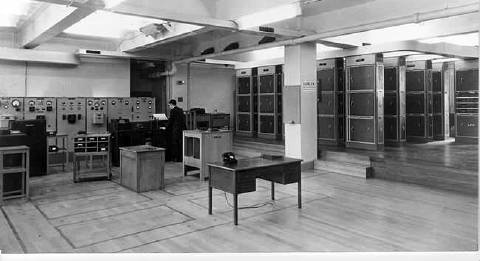Sometime we forget how young the computer revolution is. The death 10 days ago of David Caminer, who led the application programming for the world’s first business computer, the Lyons Electronic Office (LEO) is a reminder.
LEO performed its first business calculation – with 2,000 words of memory – on November 17, 1951, evaluating costs and margins on baked goods for J. Lyons & Company, a British chain of tea shops. Mr. Caminer was the systems analyst for the project, which grew into an early computer company that eventually became part of ICL.
From the obituary in the Independent
In 1947 a Lyons fact-finding team visited the United States to catch up on new developments in office methods. They learned for the first time about the newly invented electronic computer. No machine had yet been built, but they learned that Maurice Wilkes at Cambridge University was as far ahead as anyone in constructing a machine. On its return to England, the team made contact with Wilkes, who agreed to supply the design information to Lyons, and Lyons agreed to provide some additional finance and manpower to the project.
The Cambridge machine sprang into life in May 1949, and Lyons then proceeded to construct a copy of the machine. A Cambridge engineer, John Pinkerton, led on the hardware side, while Caminer was put in charge of application development.
As today, many early computer projects went disastrously wrong. Not so at Lyons. Although the technology was radical and innovative, Caminer’s approach to the computerisation of business processes was utterly conservative. He assumed that what could go wrong would go wrong. He therefore set out on a learning curve – computerising simple jobs first, and gradually taking on ones that were critical to the business, such as payroll and stock control. Caminer was an early advocate of management by exception, using the computer to bring critical issues to the attention of management.
Like some current computer industry luminaries, Mr. Caminer was political active, campaigning against British Fascist Oswald Mosely in the 30s and 40s and apartheid later, welcoming Bishop Desmond Tutu to his Borough.
Read more. The New York Times obit. An appreciation from Frank Land at the Leo Computers Society web site.
The first LEO ran for over 13 years – presaging IT’s “if it ain’t broke, why fix it?” mentality.

A LEO computer [courtesy the LEO Computers Society]
The StorageMojo take
As with so many revolutionary 20th century technologies – jet aircraft, radar, antibiotics – the British had an early lead that Americans eventually erased. Arguably the British lead in commercial business computers was the largest of all.
Given Mr. Caminer’s success in bringing large IT projects in on time, we should probably be sorry that we didn’t learn more from him and his methods.
Comments welcome, of course.


I worked on the LEO III development in the early 60’s This was the first transistor machine. It had core memory in 64 k modules, only one or two. The main memory was high speed mag tape decks, of which there were a dozen or so.
We developed all the present infrastructure of computers and more. We had redundant bits to check parity and a neat idea was ‘marginal checks’. First thing every day the computer ran a series of test programs. The innovation was to introduce a 50 Hz (UK mains) voltage into every circuit via a marginal test pin on each board. This voltage was increased until something failed. The failure level and circuit was logged. If the voltage level changed significantly then the board was changed at the next service shutdown. this made sure that the thing ran reliably with unreliable 1950s electronics.